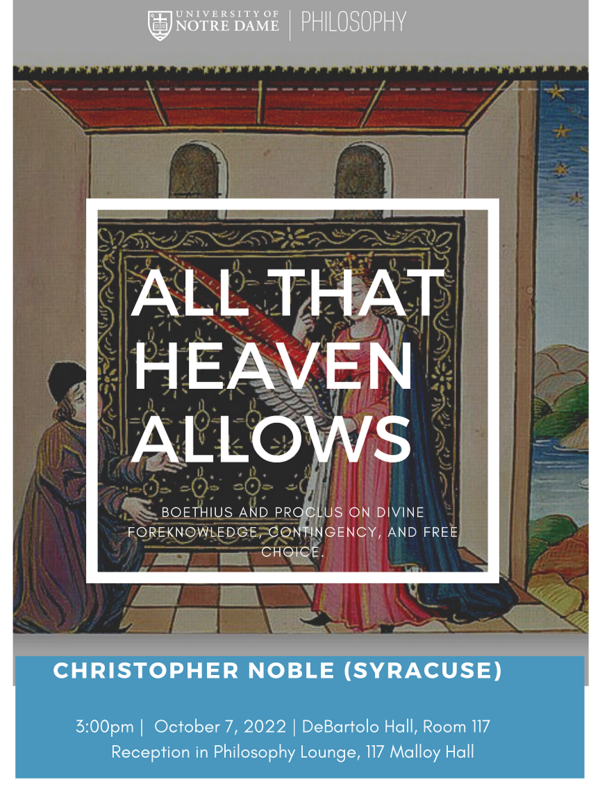Colloquium Series: Christopher Noble (Syracuse)
Christopher Noble will be giving a talk titled "All That Heaven Allows: Boethius and Proclus on Divine Foreknowledge, Contingency, and Free Choice" on October 7th from 3-5 pm. Location TBA.

Abstract: Although Boethius is often thought of as a Medieval philosopher, he is very much a product of the intellectual culture of Late Antiquity. In this talk, I will offer an example of how reading Boethius in the context of later Neoplatonist thought can better inform our understanding of his work. At the end of The Consolation of Philosophy, Boethius’ philosophical spokesperson, Lady Philosophy, offers a famous solution to the problem of divine foreknowledge and free choice. Since our actions from free choice are contingent events, the problem lies in showing that there can be divine foreknowledge of future contingents. Philosophy’s response is that God is able to know future contingents thanks to occupying a ‘timeless’ vantage point on all events in time—past, present, and future. Many interpreters have concluded that Philosophy’s ‘timelessness’ solution faces insurmountable difficulties. This negative verdict depends on the standard view that Philosophy is trying to defend free choice by reconciling divine foreknowledge with an indeterministic conception of contingency. There are, however, both historical and philosophical reasons to be suspicious of this standard, indeterministic reading. Not least of these is that the Neoplatonist Proclus employs a remarkably similar ‘timelessness’ strategy—what I will call Eternal-Temporal Determinism—to explain the consistency of divine foreknowledge with a deterministic conception of contingency. As I will argue, evidence internal to the Consolation as well as considerations of philosophical coherence strongly suggest that Philosophy is putting forward a version of Eternal-Temporal Determinism. One upshot of this determinist reading is that Philosophy grappling with a different problem than is usually thought—viz., showing the compatibility of divine foreknowledge, not with indeterminism, but with the rejection of necessitarianism. Another is that Philosophy has the philosophical resources required to defend her solution against the difficulties raised by its critics.